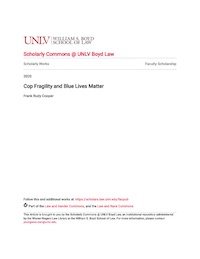By Frank Rudy Cooper
There is a new police criticism. Numerous high-profile police killings of unarmed blacks between 2012 and 2016 sparked the movements that came to be known as Black Lives Matter, #SayHerName, and so on. That criticism merges race-based activism with intersectional concerns about violence against women, including trans women. There is also a new police resistance to criticism. It fits within the tradition of the “Blue Wall of Silence,” but also includes a new pro-police movement known as Blue Lives Matter. The Blue Lives Matter movement makes the dubious claim that there is a war on police and counterattacks by calling for making assaults on police hate crimes akin to those addressing attacks on historically oppressed groups. Legal scholarship has not comprehensively considered the impact of the new police criticism on the police. It is especially remiss in attending to the implications of Blue Lives Matter as police resistance to criticism. This Article is the first to do so. This Article illuminates a heretofore unrecognized source of police resistance to criticism by utilizing diversity trainer and New York Times best-selling author Robin DiAngelo’s recent theory of white fragility. “White fragility” captures many whites’ reluctance to discuss ongoing racism, or even that whiteness creates a distinct set of experiences and perspectives. White fragility is based on two myths: the ideas that one could be an unraced and purely neutral individual—false objectivity—and that only evil people perpetuate racial subordination—bad intent theory. Cop fragility is an analogous oversensitivity to criticism that blocks necessary conversations about race and policing. Blue Lives Matter exemplifies false objectivity when it asserts that police should be their judges of what is appropriate in law enforcement. Likewise, Blue Lives Matter relies on bad intent theory when it implies that only a few “bad apples” create racial disparities. Cop fragility is dangerous because it blames the victims of police misconduct, constructs a false victim status for the police, and undermines civil rights. Racial minority communities will only give police the cooperation they need if they perceive the police to be listening to them. This Article’s specific proposal is for police departments to hold mediated listening sessions with the new police critics based on a proven methodology for mediating difficult conversations. The goal is to identify reforms that would rebuild community trust of the police. These listening sessions hold the potential to turn police resistance to criticism into meaningful cooperation
622 UNIVERSITY OF ILLINOIS LAW REVIEW [Vol. 2020


